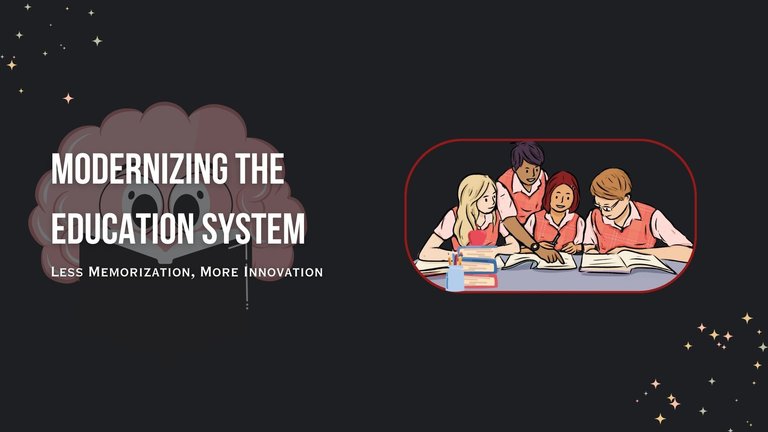Less Memorization, More Innovation: Modernizing the Education System

In today's education system, particularly in my region, the system of education is strict and based on memorization instead of actual learning. Yeah memorization might be important but yet student might not really get lost in the reason for memorization and their main focus shifts from actual learning to memorizing to pass examinations.
This is how it is for many students and how it was for me as well. I went through secondary school and University memorising a lot of things that deep down I do not know the reason why I was asides from that I needed it to pass my examinations. The real use-case of those information that was being taught in school was unknown to me and many of us just memorised it because we had to, or if not, the result will be disastrous in our results.
But instead, there should be less stringent rules in educational systems. We live in a world where information is at our fingertips, and many students are not aware of how to use and access this information. There should be less strict rules on memorisation and more objective-based tests that can give ease to the student to understand from his own point of view instead of having to memorise word for word.
With Objectives, even if a student may have forgotten the answer, if he sees it as part of the objective options,. Then he would know it. I say this because in my school, we had more complete theory examinations than objectives. It was a lot of stress on us, but we had no choice but to memorise to pass the exams without even needing to have an in-depth understanding of it.
The use of Internet/Software Access as a Medium for exams
One of the most hilarious things about studying computer science at my university is that you will write your exams that involve coding on paper. Imagine coding on paper when it should be actually done in an Integrated Development Environment (IDE).
How would a student actually learn when tools are needed in a real-world environment when the system does not allow it? Exams that restrict access to tools like these are not testing skills that are relevant to real-life work environments, and this will pose a big issue to students.
Instead Exams should involve the use of these technologies, train the students, and test them on how they can use available tools to solve complex problems—I mean problems applicable to real life.
Schools can also allow students to use their phones or internet during exams. In this case, I mean the school should focus on how students can use their ability to access through information and make decisions based on the information they find. The student can be given a complex problem or a case study, where their ability to make use of information on their fingertips can be applied to providing solutions to these problems.
Standardised tests and exams like this would leave any student ready to take on real life, with necessary skills in critical thinking, analytical skills, and processing information for personal use.
This is why it would do the present education a great good if there can be a significant shift in the system to match real-life situations. At the end of the day, the primary goal of preparing students for real-life challenges, working smartly with making use of technology, collaborating, and problem-solving skills will be attained.
I think judging the ability of ones just by memorizing power is a waste because it can't utilize the true power of education. I feel we need to focus on practical things rather than focusing on memorizing power. The education system must be creative.
Exactly brother. we really need to change the focus in our educational system from memorization to something practical. Something that we know that we be of value to students even after they finish from school.
If I am to build a school and run one. I would definitely consider this.
🎉 Upvoted 🎉
👏 Keep Up the good work on Hive ♦️ 👏
❤️ @bhattg suggested sagarkothari88 to upvote your post ❤️
Manual Curation Assistant